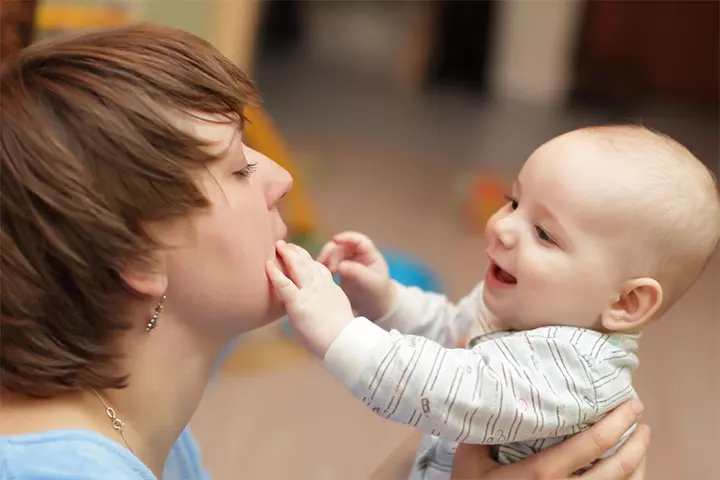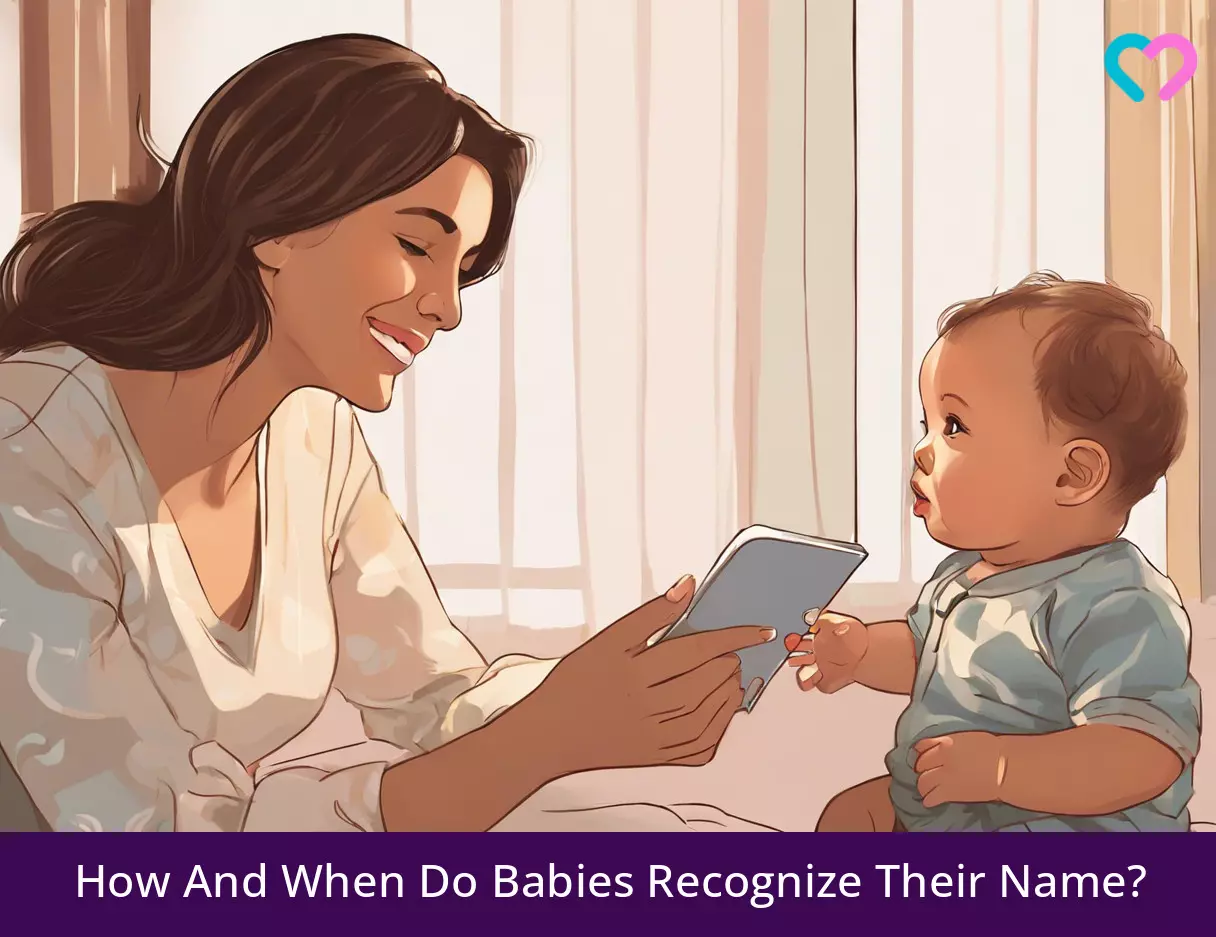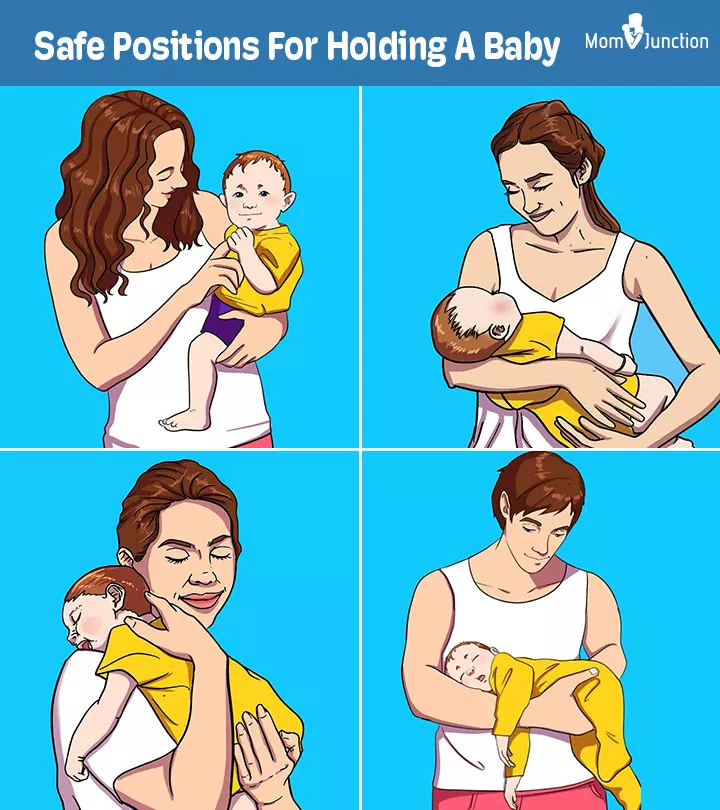
Image: ShutterStock
The feeling when your baby turns their head and comes running to you, as you call to them, is precious and incomparable. So have you ever wondered, when do babies recognize their names? Most parents are curious to know when their little one will be able to respond to their name. Babies typically develop recognition of sound within the first couple of months (1). Your baby may not speak but is constantly learning to understand what you talk and say to them from the very early months of their lives. In this post, we will tell you about when babies achieve this milestone, including when babies respond to their names and ways for you to help them attain this stage.

Key Pointers
- Most babies respond to their names between six and nine months of age.
- Babies may recognize their names better if you repeat affectionately.
- Try calling them among distractions, bring their name regularly while conversing, and encourage family members to call them.
At What Age Do Babies Know Their Names?
Babies usually begin to know and respond to their names by the age of six months (2). Each baby is different, and some may achieve the milestone later. However, most babies respond to their names by the age of nine months. If your 9-month-old baby does not respond to their name when called repeatedly, consult a pediatrician (3).
Babies learn to react to sounds before they respond to their names. They turn their heads towards a sound as early as the age of three months (4). You may have observed that your baby seems to respond to their name even before the age of six months. The reaction is likely to your voice than their name. Nevertheless, you must call your baby by their name from an early age to reinforce the sound of their name.
How Do Babies Recognize Their Names?

Babies go through a continuum of milestones before they start to recognize their names. For instance, a baby recognizes some sounds, such as their mother’s voice, by the end of their first month (5). Receptive language among babies develops earlier than expressive language (6). Hence, babies might be familiar with the sound of their names long before they realize that the sound refers to them. Affectionate, frequent repetition of their name could help them develop the ability better.
How To Help A Baby Recognize Their Name?
Here are some easy tips to help your baby recognize their name (7).
- Start calling them by their name from an early age.
- Speak the names of different objects and familiar people around them. This helps familiarize them with words better.
- Avoid calling them by their pet names, as this may confuse them.
- Facilitate a conversation with them regularly by using their name frequently.

- Try calling their name when they are looking away or when they are preoccupied.
- Say their name in an isolated setting first.
- Once your baby responds to their name in a distraction-free environment, you can try calling them in a social setting or a place with more ambient sounds.
- Increase the distractions consequently and check your baby’s response to their name from time to time.
- Check your baby’s response to their name when they hear it over the phone.
- Encourage family members and caregivers to call the baby by the same name.
- Ask a family member to video call and say the baby’s name.
- Play hide and seek with the baby; ask your partner to hide behind an object or even his hands (peek-a-boo) and loudly call out the baby’s name.
Gina, a mother and a speech therapist, recommends using one’s hand if the child is not responding. She further opines that the addition of verbal cues would help drastically. She explains, “I snapped my fingers, looked at him while calling out his name, and as soon as he made eye contact, I appreciated him by giving him a hug.” She also recommends doing this repeatedly until the child responds, following which parents can reward them with positive reinforcement (i).
 Point to consider
Point to consider
- Once your baby grows older and responds to their name better, you can string sentences or basic instructions with the baby’s name in them.
Frequently Asked Questions
1. What are the signs a baby knows their name?
The baby’s body language is the best indicator to know that they recognize their name. When a baby recognizes its name, they turn at you and make noises to repeat what you said. By 12 months, this will not happen once, but almost every time you call them by their name (8).
2. When will my baby say its name?
Babies learn to recognize their names from an early age. However, saying their own name will take time. Most babies begin saying their first name between 18 and 24 months. They may be able to take their full name by three years of age.
3. What if my baby doesn’t respond to their name?
If a baby fails to respond to their name by their first birthday, parents should speak to a pediatrician for a thorough evaluation of the underlying cause. Lack of response to their name is often considered a potential sign of an issue with receptive language skills.
When babies recognize their name, many parents or caregivers have a common curiosity. They are eager to know when the baby responds to the name which they have given. Most babies respond to their name around six months of age. However, some may reach this milestone slightly earlier than others, and a few may have a slight delay. There is nothing to worry about if there are slight delays compared to their peers. It is recommended to seek pediatric attention if your baby cannot recognize their name and other words by nine months.
Infographic: Activities To Help A Baby Recognize Its Name
Most babies learn to recognize and respond to their names by nine months of age. Our infographic shares a few activities you can indulge in to spend quality time with your baby while helping them recognize and respond to their name. Remember, babies pay attention to activities that entice them. So, make the activities engaging by using different sounds, expressions, and props whenever possible.
Some thing wrong with infographic shortcode. please verify shortcode syntax
Illustration: How And When Do Babies Recognize Their Name?

Image: Stable Diffusion/MomJunction Design Team
Are you having trouble getting your toddler to respond to their name? Join Jasna as she shares tips and tricks to help your child respond to their name!
Personal Experience: Source
MomJunction articles include first-hand experiences to provide you with better insights through real-life narratives. Here are the sources of personal accounts referenced in this article.
i. How to teach your child to respond to their name;https://www.youtube.com/watch?feature=shared&v=vbjaZ-U7JmM
References
1. Denise R. Mandel, Peter W. Jusczyk, and David B. Pisoni, Infants’ Recognition of The Sound Patterns of Their Own Names; NCBI
2. Important Milestones: Your Baby By Six Months; CDC
3. Important Milestones: Your Baby By Nine Months; CDC
4. Important Milestones: Your Baby By Two Months; CDC
5. Developmental Milestones for Baby; March of Dimes
6. Speech and Language Milestones, Birth to 1; Year C.S. Mott Children’s Hospital
7. Activities to Encourage Speech and Language Development; American Speech-Language-Hearing Association
8. Language Delays in Toddlers: Information for Parents; AAP
9. Your Baby’s Hearing and Communicative Development Checklist; NIH
Community Experiences
Join the conversation and become a part of our nurturing community! Share your stories, experiences, and insights to connect with fellow parents.
Read full bio of Dr. Anuradha Bansal
Read full bio of Swati Patwal
Read full bio of Rebecca Malachi
Read full bio of Vidya Tadapatri

 Quick fact
Quick fact














